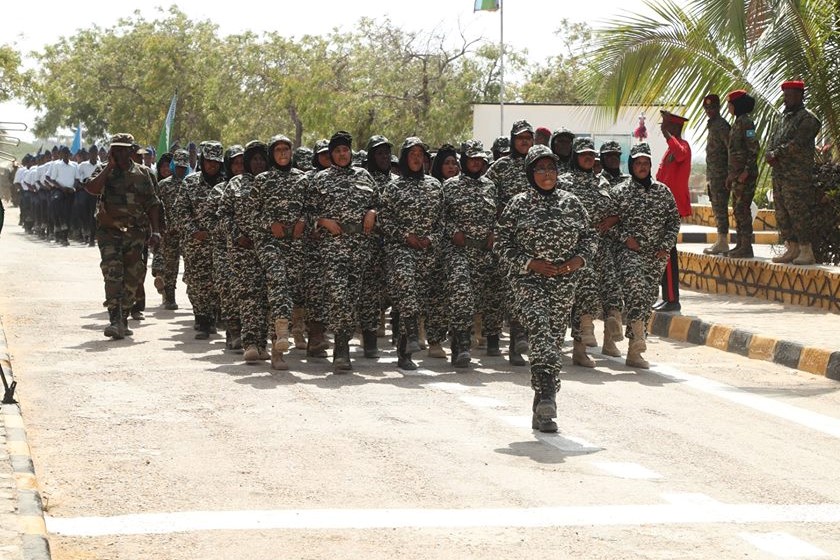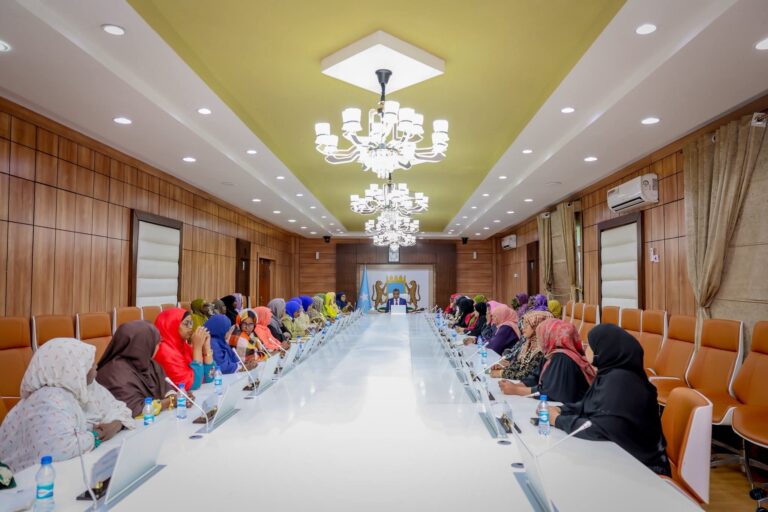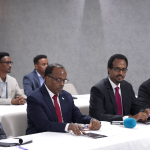Mogadishu, Somalia (SONNA): Somalia’s successful campaign against terror and its march toward stability are anchored by the patriotism and resolve of its women. As the Federal Government of Somalia, with the full-throated support of its people, enters the final phase of its righteous campaign against the Khawarij terrorists, Somali women have answered the call to nationhood. They are mobilizing with selfless patriotism, not only to support the national victory but to build the enduring peace that will follow.
From the front lines of the war against extremism to the complex corridors of community reconciliation, women are demonstrating that the fight for Somalia’s future is won on two fronts: the battlefield of security and the battle for societal healing. Their contributions, often made at great personal risk and with immense sacrifice, are a clear indication of their indispensable role in cementing a stable and a sovereign nation.
A Total Mobilization: From the Front Lines to the Home Front
The national appreciation for this patriotic mobilization was recently given a powerful voice by the Prime Minister of the Federal Republic of Somalia, His Excellency Hamza Abdi Barre. In a high-level meeting on October 31, 2025, with women leaders from civil society, leadership forums, and the security forces, the Prime Minister affirmed their critical role in the nation’s survival and future.
His Excellency commended the women for their foundational contributions to peacemaking, national reconstruction, and development. He emphatically stated that “lasting statehood and sustainable peace cannot be achieved unless women are given a visible, decision-making role” in the nation’s affairs.
This high-level government recognition is not an abstract compliment; it is a direct acknowledgment of the total mobilization seen across the nation, especially during the recent popular uprising against the terrorists. Somali women have proven to be the backbone of this national liberation, engaging in every capacity required to win.
They have been instrumental in providing food, water, and vital supplies to the soldiers of the Somali National Army and the allied local Ma’awiisley forces. Women have organized massive logistical operations from their communities, cooking tirelessly and delivering essential provisions directly to the front lines, ensuring the fighters have the strength and morale to continue the battle.
Beyond this material support, women have been instrumental on the ideological battlefront. They have acted as the nation’s voice of courage, publicly sensitizing their communities and standing defiantly against the terror group’s campaign of intimidation. Through community forums, radio appearances, and their powerful networks, they have dismantled the wall of fear that the Khawarij spent years building, encouraging sons, husbands, and brothers to join the fight for freedom.
In the most profound display of patriotic resolve, women have also taken their place on the front lines. In community after community, as the uprising took hold, women were seen taking up arms alongside their brothers, holding guns and directly battling the enemy. They have served as integral members of local community defense forces, standing shoulder-to-shoulder with men to protect their homes, their children, and their nation’s dignity.
And when the battle for a town is won, their work continues. They are actively engaged in the critical work of rehabilitating youth and defectors from Al-Shabaab. Their methods are both compassionate and pragmatic, providing counseling, sports, and therapy to give these young men a “second chance.” Crucially, they link this healing process to economic reality, working with the business community to overcome resistance and secure jobs for former combatants. This is the difficult, essential work of nation-building, transforming former instruments of violence into productive citizens and ensuring that the government’s military victories translate into permanent peace.
Architects of Grassroots Stability
Long before peace is debated in high-level forums, it is built, street by street and village by village, by Somali women. They are the primary mediators in their communities, often beginning their work by resolving localized disputes over resources like “land or pasture.” This grassroots peacemaking is more critical than ever, as climate change and severe drought, a major displacer of women and girls exacerbate resource-based conflicts.
In communities across the nation, where institutions have faltered, women have built new ones. They have formed local groups acting as “neighborhood watches” and established new systems for reporting suspicious activity to the police, dramatically improving local security. This is the essence of their contribution: they are not just peace-keepers; they are transformational change agents who are actively building the local security infrastructure that underpins the stability of the state.
A Patriotic Struggle for a Place at the Table
The great irony is that the Somali public is far ahead of the political elite in recognizing women’s capabilities. While a small contingent of gatekeepers remains a barrier, the Somali people are not. Comprehensive surveys show an overwhelming 80% of the public believes women have a right to participate in the administration of their country. Furthermore, 74% of Somalis support legislating the 30% quota to make it a constitutional reality.
This public faith is well-placed. Polls reveal that 58% of Somalis believe women politicians represent the interests of the Society, while viewing male politicians as more likely to represent their personal (22%) or clan (20%) interests.
Despite this clear public mandate, women’s political representation in the Lower House tragically decreased from 24% in 2016 to just 20% in the 2021/22 election. The barriers are not capability or public support, but systemic. Women candidates are often forced to sell their property to finance their campaigns, lacking the clan and business networks that finance their male counterparts.
This is not just a question of rights; it is a question of national strategy. The Federal Government’s agenda for stabilization, economic reform, and final victory over extremism requires the best and brightest our nation has to offer. To sideline the very women who have proven most effective at building peace from the ground up is a strategic loss we cannot afford.
The call to nationhood has been answered. Somali women have demonstrated their patriotism with action, not just words. They are fighting on our front lines, feeding our army, healing our communities, and fighting for a just and stable future. It is now the patriotic duty of the nation—led by its government, and as affirmed by Prime Minister Barre to heed the public’s call, dismantle the final barriers, and fully integrate these proven architects of peace into all levels of leadership. Securing their 30% quota is not a concession, but a strategic imperative. By locking in their contribution at the highest levels, the nation ensures this hard-won victory endures and that the foundation of our new, stable Somalia is built to last.






